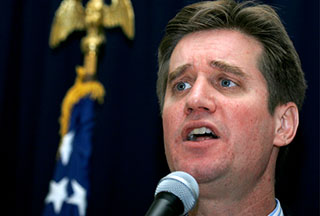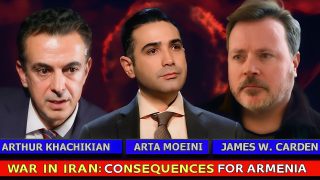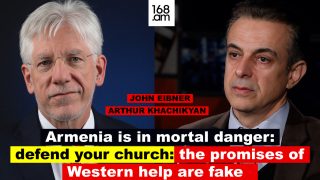Matthew Bryza: “Russia’s President is committed not to resolving, but to aggravating or even creating regional conflicts”

Interview with former Co-Chair of the OSCE Minsk Group, former U.S. Ambassador to Azerbaijan, nonresident Senior Fellow at Dinu Patriciu Eurasia Center of the Atlantic Council of the United States: Ambassador Matthew Bryza
– Mr. Bryza, what is your assessment to the present situation of the Karabakh conflict? Azerbaijan has recently increased provocations not only on the line of contact with Nagorno-Karabakh, but also on the Armenian-Azerbaijani front-line. In July even subversive group penetrated Karvachar (Kelbajar) and killed two armenians. Of course, Armenian side gives balanced answers to these ations by Azerbaijan, but it does not diminish the war rhetoric by the leadership of Azerbaijan. How do you see the solution of the problem in this situation?
– The present situation of the Karabakh conflict is tense for the unfortunate soldiers and residents who find themselves close to the line of contact, but relatively stable from the perspectives of Baku and Yerevan. I know the Minsk Group Co-Chairs are working diligently to reduce — and hopefully, eliminate — deaths along the Line of Contact. At the same time, I view these continued and tragic incidents as a reflection not of extreme tension between Armenia and Azerbaijan, but rather, of frustration that not enough is being done to restore progress in negotiations to finalize the Basic Principles of a settlement of the Nagorno-Karabakh conflict. Such progress will result only if and when Presidents Aliyev and Sargsyan develop sufficient confidence in each other’s willingness and ability to deliver the significant compromises required to resolve the relatively small number of unresolved elements of the Basic Principles.
Ultimately, this will require personal intervention by the United States President and Secretary of State, working with their French and Russian counterparts. For now, however, it appears Russia’s President is committed not to resolving, but to aggravating or even creating regional conflicts, as in eastern Ukraine.
– Do you think the Presidents of Armenia and Azerbaijan will meet in Paris as suggested the president of France? Can it really help the peace process or at least to reduce tensions on the front-line?
– I think it is essential for the Presidents of Armenia and Azerbaijan to meet regularly. If French President Hollande is willing to become personally involved in helping the Presidents of Azerbaijan and Armenia resurrect a serious dialogue, perhaps the two sides can achieve the breakthrough that was within reach during 2007-2009 under Russian President Medvedev’s intervention. But, even if the parties were to achieve such a breakthrough on the Basic Principles, there would be one crucial element remaining: convincing Russian President Putin to resolve rather than perpetuate the conflict.
President Hollande’s predecessor failed to approach the South Caucasus conflicts with this sort of realism and brokered a terrible ceasefire agreement during the Russia-Georgia War under pressure from then-Prime Minister Putin. That agreement was highly favorable to the country that invaded its neighbor; and still, Russia has failed to honor even that agreement.
– What is your opinion about the six elements which represented the U.S. Co-Chair of OSCE Minsk Group James Warlick during his statement in Carnegie Endowment for International Peace? I should note that the authorities of Nagorno-Karabakh Republic don’t agree with that statement. Particularly, the MFA of NKR stated that there’s no return to the past. And the spokesperson of NKR’s President thinks that changing of the status quo will bring another war by Azerbaijan, because it has territorial claims to the entire territory of Nagorno-Karabakh, even to Armenian Republic.
– I support the six elements mentioned by Ambassador Warlick. These are the same elements I helped negotiate while serving as the U.S. Co-Chair and which I described during my very first interview in that capacity (to the Armenian Service of Radio Liberty in June 2006). Those Basic Principles include a provision to legalize the political status quo in Nagorno-Karabakh, meaning that Nagorno-Karabakh’s current residents will have the right to elect their own officials and regulate their own political, legal, and economic affairs, while determination of NK’s final legal status would occur via a vote of NK’s population at a time to-be-determined in the future. It is important to define terms carefully. Legalizing NK’s political and economic status quo would in fact mark a change in the overall status quo of the conflict by providing NK’s residents a profoundly deeper sense of security.
– And one more question I’d like to ask. What do you think about Armenia’s joining to the Eurasian Economic Union? Is it based on the national interests of Armenia?
– It is obvious to any observer of the South Caucasus that Armenia was pressured by Russia into joining the Eurasian Economic Union. This step was important to President Putin as part of his broader strategy to restore Russian influence in the former Soviet space, and to propose a Eurasian model for social and economic development as a supposed alternative to the West’s free market economics and democracy. Armenia’s expressed preference had been to sign an Association Agreement with the European Union and align itself with Western values, but Russia refused to permit Armenia to determine its own fate.
Interviewed by Aram Sargsyan

























